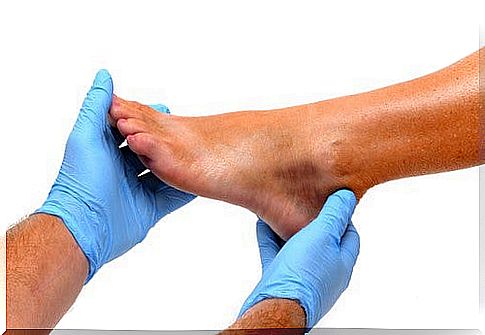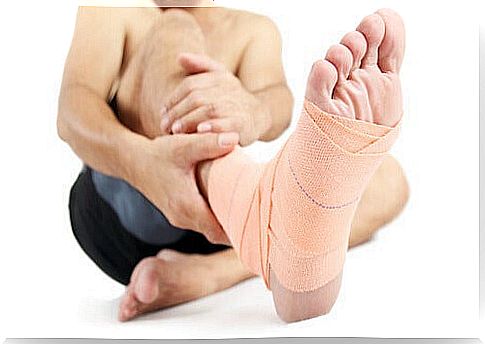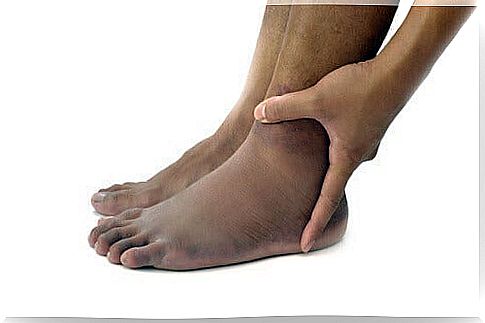Swollen Ankles And Feet: Causes And Prevention

If you have swollen ankles and feet for an extended period of time, or if you have other symptoms in addition to the swelling, this could be an indication of a more serious health problem.
In this article, we will explain some of the reasons for swollen ankles and feet.
Complications during pregnancy
Swollen ankles and feet during pregnancy are very normal. However, sudden or excessive swelling may be a symptom of preeclampsia.
This is a condition where blood pressure rises and proteins are found in the urine after the 20th week of pregnancy. If you notice such excessive swelling, it is best to see a doctor right away.
Also do this when other symptoms appear. For example, think of:
- stomach ache
- headache
- decreased urine production
- nausea or vomiting
- changes in your vision
Swollen ankles or feet from injury

Of course, foot or ankle injuries can also lead to swelling. Sprained ankles are the most common. They occur when a lesion or wrong step causes the ligaments in the ankle to stretch further than they normally would.
To reduce swelling from a foot or ankle injury, you need to rest. You should also avoid leaning on the affected foot. Keep plenty of ice against the painful area. Also wrap the ankle or foot with a compression bandage. Then place your foot on a platform, such as a pillow or chair.
However, if the pain or swelling is unbearable or if it does not improve after home care, see a doctor.
Lymphedema
Lymphedema is the result of a buildup of lymph fluid in the tissue. This is due to a problem with the lymphatic system or the removal of the lymph nodes.
Lymph is a fluid rich in protein, which normally runs through an extensive web of veins and capillary vessels. The lymph nodes filter this fluid. There the unwanted substances such as bacteria are retained and removed.
When there is a problem in the veins or lymph nodes, the flow of the fluid can be blocked. If this problem is not treated, lymph fluid can build up. As a result, wounds can heal less quickly and infections can occur.
Lymphedema often occurs after radiotherapy or after the removal of lymph nodes in cancer patients. If you have had cancer treatment and notice swelling, call your doctor right away.
Insufficient functioning of the veins

Swollen ankles and feet are often an early symptom of venous insufficiency. This is a condition in which the blood does not move sufficiently upward from the veins in the legs and feet to the heart. Normally, the one-way valves in the veins provide this upward current.
However, when these valves are damaged or weakened, the blood filtered down through the veins and certain fluids is retained in the lower extremities, especially the ankles and feet.
Chronic venous insufficiency can lead to:
- skin discoloration
- skin ulcers
- infections
If you notice any symptoms of venous insufficiency, see your doctor right away.
Infection
Swollen ankles or feet can also be a sign of an infection. People who suffer from diabetic neuropathy or other nerve problems in the feet are more likely to develop foot infections.
So if you are a diabetic, it is important to check your feet daily for blisters and skin ulcers. The damage to the nerves can ensure that you do not feel the pain. In that case, foot problems quickly worsen.
If you notice that your foot is swollen or has an inflamed blister, contact your doctor.
Blood clots
Blood clots that form in the veins of the feet can stop blood circulation from the feet to the heart. This causes feet and ankles to swell.
Blood clots can occur superficially, in the veins on the surface of the skin. But they can also arise deeper. This is a condition also known as a deep vein thrombosis.
Deep blood clots can clog one or more of the primary veins in the legs. Such a clot can be fatal if it breaks loose and travels to the heart or lungs.
If you notice a swelling in one of your legs and it is accompanied by pain, low fever and possibly discoloration in the affected leg, it is vital that you contact your doctor immediately. You may need treatment with blood thinners.
Heart, liver or kidney disease
Sometimes swelling can indicate a problem with your heart, liver, or kidneys. Do your ankles swell at night? This could be a sign of salt and fluid buildup caused by the failure of the right side of the heart.
Kidney disease can also lead to swollen ankles and feet. When the kidneys are not working optimally, fluids can build up in the body.
Liver disease can alter the production of a protein molecule called albumin. Albumin prevents blood from escaping from the blood vessels to the surrounding tissue.
An insufficient production of albumin can therefore lead to a loss of fluids. This ensures that more fluid is retained in the feet and ankles, but sometimes also in the abdomen and chest.
If the swelling is accompanied by other symptoms, see your doctor. Think, for example, of fatigue, loss of appetite or weight gain. If breathing in becomes painful or difficult, or if you feel pressure or weight on your chest, call an ambulance.
Medication Side Effects
Many different types of medication can cause swelling in the feet and ankles as a side effect. If you suspect that the swelling is a result of the medication you are taking, consult your doctor.
Nevertheless, with the benefits of the medication in mind, it can’t hurt to tolerate a little swelling. However, if you are experiencing serious swelling or inflammation, your doctor may recommend that you change your medication or adjust the dose.









